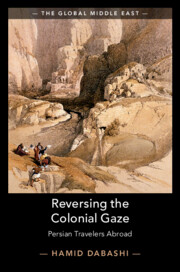Book contents
- Reversing the Colonial Gaze
- The Global Middle East
- Reversing the Colonial Gaze
- Copyright page
- Dedication
- Contents
- Figures
- Preface
- Acknowledgments
- Introduction
- 1 Mr. Shushtari Travels to India
- 2 Mirza Abu Taleb Travels from India
- 3 An Ilchi Wonders about the World
- 4 A Colonial Officer Is Turned Upside-Down
- 5 A Shirazi Shares His Travelogues
- 6 A Wandering Monarch
- 7 Hajj Sayyah Leads a Peripatetic Life
- 8 In the Company of a Refined Prince
- 9 A Wandering Mystic
- 10 In and out of a Homeland
- 11 The Fact and Fiction of a Homeland
- 12 Professor Sayyah Comes Home to Teach
- Conclusion
- Index
10 - In and out of a Homeland
Published online by Cambridge University Press: 19 December 2019
- Reversing the Colonial Gaze
- The Global Middle East
- Reversing the Colonial Gaze
- Copyright page
- Dedication
- Contents
- Figures
- Preface
- Acknowledgments
- Introduction
- 1 Mr. Shushtari Travels to India
- 2 Mirza Abu Taleb Travels from India
- 3 An Ilchi Wonders about the World
- 4 A Colonial Officer Is Turned Upside-Down
- 5 A Shirazi Shares His Travelogues
- 6 A Wandering Monarch
- 7 Hajj Sayyah Leads a Peripatetic Life
- 8 In the Company of a Refined Prince
- 9 A Wandering Mystic
- 10 In and out of a Homeland
- 11 The Fact and Fiction of a Homeland
- 12 Professor Sayyah Comes Home to Teach
- Conclusion
- Index
Summary
In Chapter 10, “In and out of a Homeland,” Yahya Dowlatabadi’s Hayat-e Yahya/The Life of Yahya (1893) is the subject of my close reading. Yahya Dowlatabadi was a prominent poet, calligrapher, and social activist of the Constitutional period. His posthumous autobiography, Hayat-e Yahya, is a remarkable account of his life as a revolutionary activist. His father was a representative of Yahya Sobh Azal, the successor to Bab, the founder of the revolutionary Babi movement in Iran. He delegated that authority to his son Mirza Yahya Dolatabadi, who was a revolutionary social reformist initiating serious educational reform in his homeland. Throughout his life he was either exiled or else traveled extensively in and around the Qajar and Ottoman territories and visited Istanbul, Berlin, London, and Stockholm. In his multivolume autobiography, Dowlatabadi gives a detailed account of his life and travels. What is particular about this text is the deeply involved presence of its author in the most volatile period of his homeland, and therefore his journeys are the spatial extensions of his political activism in a critical period in Iran. His presence in this constellation of travelers is crucial for us to see how there is a narrative and institutional organicity to these travelogues that places the post/colonial subject on an effervescent transnational public sphere.
Keywords
- Type
- Chapter
- Information
- Reversing the Colonial GazePersian Travelers Abroad, pp. 260 - 307Publisher: Cambridge University PressPrint publication year: 2020

